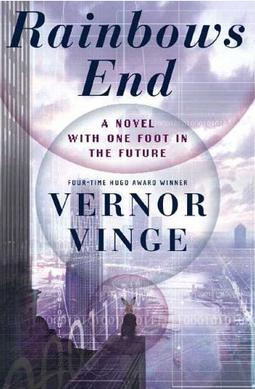Rainbows End (Vinge novel)
Rainbows End is a science fiction novel by Vernor Vinge, published in 2006. It is set in a near-future world where technological advancements have significantly impacted daily life, particularly through the use of augmented reality and the internet. The novel explores themes of intelligence, technology, and societal change. It won the Hugo Award for Best Novel in 2007, showcasing Vinge's prowess in the science fiction genre.
Plot Summary[edit | edit source]
The story revolves around Robert Gu, a renowned poet who recovers from Alzheimer's disease thanks to a new treatment. However, the world he wakes up to is vastly different from the one he remembers. Technology has advanced to the point where people interact with the world and each other through wearable computers and sophisticated virtual reality interfaces. Robert must navigate this new world, relearn how to live in it, and reconcile with his estranged family. Meanwhile, a global conspiracy unfolds, involving a potentially dangerous new technology that could change the nature of humanity and reality itself.
Themes and Analysis[edit | edit source]
Rainbows End delves into several significant themes, including the impact of technology on society, the concept of reality versus virtual reality, and the potential for both positive and negative changes that technological advancements can bring. Vinge also explores the generational gap in technology adoption and understanding, as seen through the character of Robert Gu, who struggles to adapt to a world that has moved beyond his comprehension.
The novel is notable for its detailed depiction of future technologies, which Vinge presents as both awe-inspiring and potentially threatening. The use of augmented reality, in particular, is portrayed as a double-edged sword, offering new ways of experiencing the world but also raising questions about privacy, security, and the nature of human interaction.
Reception[edit | edit source]
Rainbows End received critical acclaim for its imaginative vision of the future and its exploration of complex themes. Critics praised Vinge's ability to weave a compelling narrative with thought-provoking ideas about technology and society. The novel's win of the Hugo Award for Best Novel is a testament to its impact on the science fiction genre and its relevance to contemporary discussions about technology and its role in shaping our future.
See Also[edit | edit source]
Search WikiMD
Ad.Tired of being Overweight? Try W8MD's physician weight loss program.
Semaglutide (Ozempic / Wegovy and Tirzepatide (Mounjaro / Zepbound) available.
Advertise on WikiMD
|
WikiMD's Wellness Encyclopedia |
| Let Food Be Thy Medicine Medicine Thy Food - Hippocrates |
Translate this page: - East Asian
中文,
日本,
한국어,
South Asian
हिन्दी,
தமிழ்,
తెలుగు,
Urdu,
ಕನ್ನಡ,
Southeast Asian
Indonesian,
Vietnamese,
Thai,
မြန်မာဘာသာ,
বাংলা
European
español,
Deutsch,
français,
Greek,
português do Brasil,
polski,
română,
русский,
Nederlands,
norsk,
svenska,
suomi,
Italian
Middle Eastern & African
عربى,
Turkish,
Persian,
Hebrew,
Afrikaans,
isiZulu,
Kiswahili,
Other
Bulgarian,
Hungarian,
Czech,
Swedish,
മലയാളം,
मराठी,
ਪੰਜਾਬੀ,
ગુજરાતી,
Portuguese,
Ukrainian
Medical Disclaimer: WikiMD is not a substitute for professional medical advice. The information on WikiMD is provided as an information resource only, may be incorrect, outdated or misleading, and is not to be used or relied on for any diagnostic or treatment purposes. Please consult your health care provider before making any healthcare decisions or for guidance about a specific medical condition. WikiMD expressly disclaims responsibility, and shall have no liability, for any damages, loss, injury, or liability whatsoever suffered as a result of your reliance on the information contained in this site. By visiting this site you agree to the foregoing terms and conditions, which may from time to time be changed or supplemented by WikiMD. If you do not agree to the foregoing terms and conditions, you should not enter or use this site. See full disclaimer.
Credits:Most images are courtesy of Wikimedia commons, and templates Wikipedia, licensed under CC BY SA or similar.
Contributors: Prab R. Tumpati, MD

